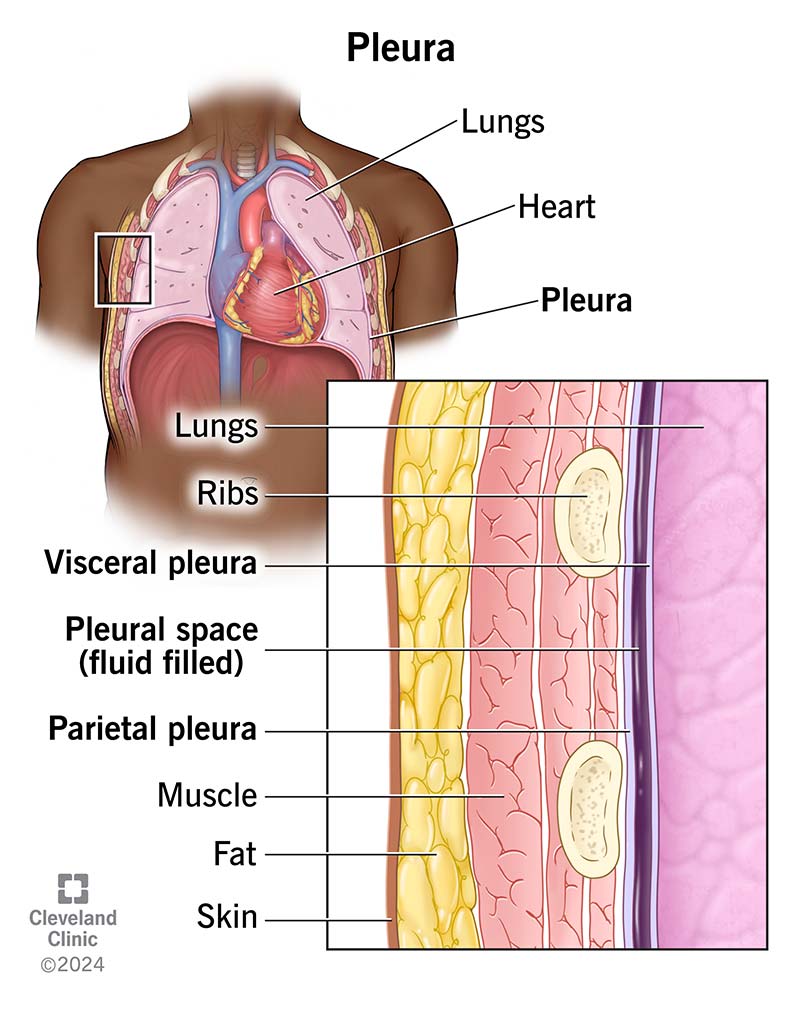Your pleura is a thin membrane that lines your chest wall and lungs. It cushions your lungs and makes breathing easier. Infections and chest injuries can damage your pleura and affect your ability to breathe. You can help protect your pleura by wearing padding while playing sports and wearing a seatbelt every time you’re in a car.
Advertisement
Cleveland Clinic is a non-profit academic medical center. Advertising on our site helps support our mission. We do not endorse non-Cleveland Clinic products or services. Policy

Image content: This image is available to view online.
View image online (https://my.clevelandclinic.org/-/scassets/images/org/health/articles/pleura)
Your pleura is a thin, watery (serous) tissue (membrane) that lines the walls of your chest (thorax) and wraps around the outside of your lungs. It’s part of your respiratory system.
Advertisement
Cleveland Clinic is a non-profit academic medical center. Advertising on our site helps support our mission. We do not endorse non-Cleveland Clinic products or services. Policy
The function of your pleura is to help cushion your lungs and prevent them from rubbing against your chest wall.
Your pleura:
A hollow area (pleural space) lies between the layers of your pleura. Your pleural space contains a thin layer of pleural fluid. Pleural fluid helps your pleura move as you breathe.
The pleura has two layers:
Common pleural disorders include:
Advertisement
Pleural damage may cause sharp pain that worsens when you breathe normally, take deep breaths or cough. You may feel like you can’t get enough air in your lungs (dyspnea). Damage may occur after an injury to your chest, like a fall, a contact-sport injury, a car accident, or a knife or gunshot (puncture) wound.
If you have symptoms of severe pleural damage, call 911 or your local emergency number immediately.
Healthcare providers may order the following tests to diagnose a condition that affects your pleura:
It depends on what condition affects your pleura and its severity. Treatments may include:
You can help reduce your risk of pleural damage by:
Your pleura plays an important role in your respiratory system, cushioning your lungs from rubbing against your chest wall and making breathing easy and comfortable. You’ll know if you have a condition that affects your pleura — you may feel like you can’t catch your breath and it can hurt to breathe. If you play a high-impact sport, talk to a healthcare provider about how to keep your pleura healthy and prevent injuries.
Advertisement

Sign up for our Health Essentials emails for expert guidance on nutrition, fitness, sleep, skin care and more.
Learn more about the Health Library and our editorial process.
Cleveland Clinic’s health articles are based on evidence-backed information and review by medical professionals to ensure accuracy, reliability and up-to-date clinical standards.
Cleveland Clinic’s health articles are based on evidence-backed information and review by medical professionals to ensure accuracy, reliability and up-to-date clinical standards.
Cleveland Clinic’s primary care providers offer lifelong medical care. From sinus infections and high blood pressure to preventive screening, we’re here for you.
